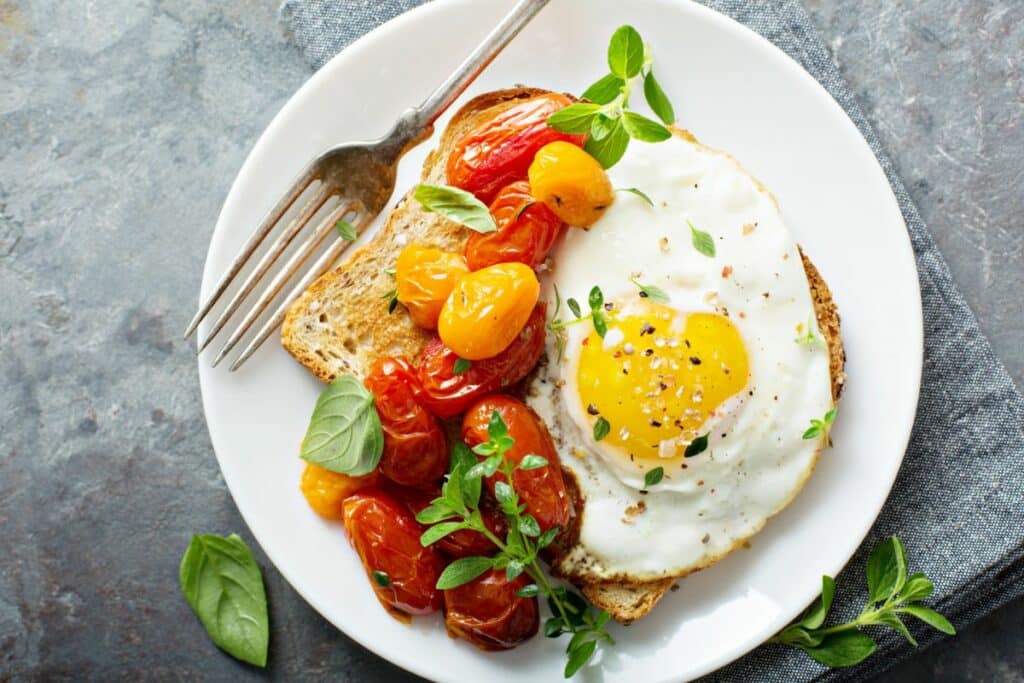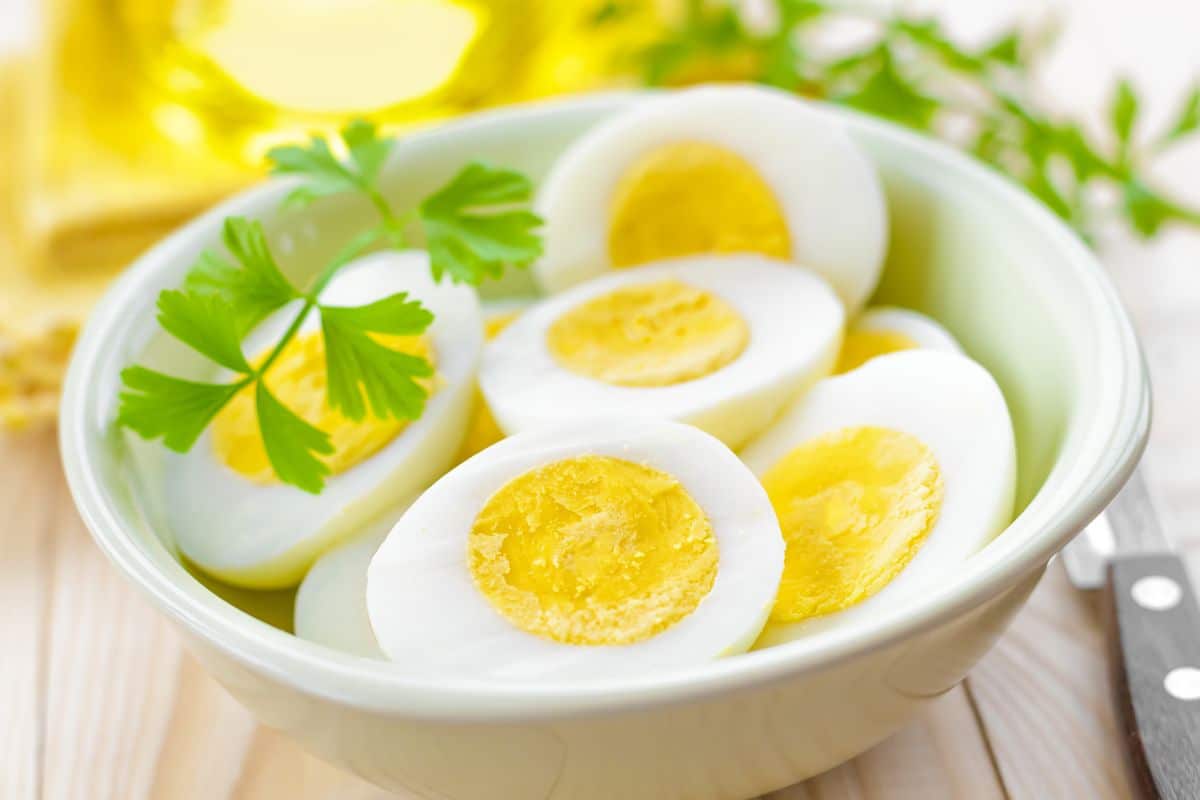Eggs are a well-known protein source. Since protein is so important for growth and repair as well as overall health, it is crucial to get enough of this nutrient in your diet.

Because of this, many people rely on eggs to ensure healthy cells and bodily tissues, as well as optimal enzyme and hormone production.
A single egg can provide you with a significant amount of protein, and depending on your activity level, this could help you on your way to hitting your daily protein goal.
However, it’s important to understand what other nutrients eggs contain, how many calories eggs provide when prepared in different ways, and how many eggs it’s wise to consume in a day.
This will minimize your risk of unwanted side effects and health issues.
If you’re curious about the protein in eggs, keep reading. This guide contains all the information you need about egg consumption and protein.
How Much Protein In One Egg?
First and most importantly, it’s a good idea to understand how much protein one egg provides. You can use this as a baseline to decide how many eggs you want to eat in a day.
Of course, eggs come in different sizes, ranging from small to large.
Naturally, smaller eggs won’t provide you with as much protein as larger eggs. However, we can use averages to come up with an estimate.
While a small egg might provide you with 5 grams of protein, a large egg could contain as many as 8 grams of protein.
This means that on average, a medium-sized egg will contain between 6 and 7 grams of protein.
Bear in mind that although the white of an egg is mostly made up of protein, that doesn’t mean that the egg yolk is devoid of protein.
In fact, about 50 percent of an egg’s protein content is in the yolk, but it contains other nutrients, too.
Is There More Protein In Raw Eggs?
Before we move on to discuss how many eggs you should consume per day, we want to address a common question: is there more protein in raw eggs?
There is a commonly-held misconception that by eating raw eggs, you’ll get more protein than if you cook the eggs before eating them. However, this is not actually true.
In fact, eating eggs raw may reduce the amount of protein you can get from each egg. That’s because only 50% of raw egg protein can be absorbed.
Not only that, but there are health risks associated with eating raw eggs.
Eggs that have not been cooked may carry salmonella and other bacteria such as E.Coli. These bacteria can cause severe food poisoning.
On the other hand, when you cook an egg, you will be able to absorb 90% of the protein.
So, if your goal in eating eggs is to increase your protein intake, you should definitely stick to cooking eggs and avoid eating them raw. This is the healthiest option, as well as the tastiest.
The Recommended Amount Of Eggs Per Day
So, here’s the big question: how many eggs can you eat on a daily basis? You might think that the answer from a protein perspective is ‘as many as possible’.
However, before you start eating copious quantities of eggs every day, take a moment to learn about the other nutritional factors involved in egg consumption.
Based on the amount of protein in the average egg (6-7 grams), the average grown man would need to consume about 9 eggs per day to meet his minimum protein needs.
Meanwhile, the average woman would need to consume 7 eggs.
However, this is not a good idea for various reasons, including lack of other nutrients and insufficient caloric intake for the day.
In general, it is recommended to eat up to 3 eggs per day.
Studies have shown that this is safe, although there isn’t enough research to predict the nutritional impact of eating more than 3 eggs on a daily basis.
This is because, although eggs contain helpful nutrients such as high-density lipoproteins (good cholesterol), they can raise overall cholesterol levels dangerously when consumed in excess.
Studies have shown that the risk of developing heart disease increases when egg consumption is too high.
With that being said, if you eat eggs in moderation, limiting your consumption to 3 eggs per day, it can have a very positive impact on your heart function and overall health.
Different Ways To Prepare Eggs

The amount of protein and other nutrients, as well as overall calories, you can expect to get from eggs depends not only on how many you eat, but how you prepare them.
1. Fried
While there are many ways to prepare eggs, many people prefer to fry them sunny side up.
This can be delicious, but depending on how you go about it, it can also increase the overall calorie count significantly.
If you just use a light oil spray to fry your eggs, then a single fried egg might only contain around 85 calories. However, if you’re using more oil, your fried egg might contain over 120 calories.
2. Scrambled
Scrambling is one of the most popular ways to cook eggs. It’s quick and easy, so it’s an excellent breakfast staple.
There are 91 calories in one portion of scrambled eggs. However, be careful if you’re adding a lot of milk to your scrambled eggs, as this can increase the overall calorie count.
3. Boiled
If you want to keep the calorie count of your egg-based dish low, you should consider boiling your eggs.
One boiled egg contains around 78 calories. All you need to do in order to boil an egg is put the egg into boiling water and wait a few minutes for the white to solidify.
Depending on whether you want the yolk to be firm or runny, you might have to wait longer or take the egg out sooner.
If you want to take the guesswork out of the process, consider investing in an electric egg boiler, especially if you eat several eggs on a regular basis.
4. Poached
Poaching eggs is another low-calorie way to prepare this food. However, bear in mind that poaching an egg essentially means undercooking it so that the yolk is almost raw.
This means you won’t absorb as much protein from a poached egg as you would from an egg prepared in a different way.
One poached egg contains around 72 calories. Although the protein you can absorb from a poached egg is limited, you will still get plenty of other nutrients from it, including good cholesterol.
5. Deviled
Deviled eggs are one of the tastiest ways to prepare eggs. They’re basically boiled eggs, except you remove the yolk after boiling, and mash it with some herbs and spices.
Deviled eggs are party favorites, but they’re also a great way to satisfy your taste buds while getting your protein.
On average, a deviled egg contains around 98 calories, although some deviled egg recipes include more toppings, and this can impact the overall calorie content.
6. Omelet
An omelet contains roughly 150 calories because it is usually made with multiple eggs.
The recipe for a basic omelet is similar to scrambled eggs, but it’s a little more filling, and you can make the dish more exciting by adding extra ingredients.
If you want to increase your micronutrient consumption, consider adding vegetables such as tomatoes, mushrooms, onions, and spinach to your omelet.
On the other hand, you can increase the protein content by adding some bacon or sausage. However, make sure to consider the added calories and fats that this can contribute.
Final Thoughts
Eggs contain a significant amount of protein, with the average medium egg (complete with the yolk) providing between 6 and 7 grams of protein.
You can maximize the amount of protein you absorb from your eggs by eating them cooked instead of raw and adding other ingredients to your eggs.
It is recommended to eat a maximum of 3 eggs per day to avoid incurring heart health issues.
Eating up to 3 eggs per day can help to improve your heart health because of high-density lipoproteins and allow you to progress toward your protein goals each day.
Frequently Asked Questions
Yes, you will get more protein from adding cheese to your eggs, but you will also end up consuming much more saturated fat in the process.
When you crack an egg, you might notice a small red spot. This is a blood spot, and while it can look alarming if you’ve never seen one before, it doesn’t mean your egg is unsafe to eat.
Blood spots in eggs happen because a blood vessel has ruptured. You can just cook the egg and eat it, and you probably won’t even notice the spot.
However, if you’re not comfortable with that, just scrape out the blood and throw it away.
Have you ever noticed that some eggs have very dark, almost orange-looking yolks, while other yolks are more of a pale yellow color?
This is simply a result of what kind of food hens are fed. When hens eat a mostly wheat-based diet, they are likely to lay eggs with light yellow yolks.
On the other hand, corn-fed hens will lay eggs with darker yolks.
In case you’re wondering, the color of the yolk does not impact how an egg tastes, and it also doesn’t make any difference to its nutritional value. It’s purely aesthetic.
Another color difference that leaves a lot of egg lovers wondering is the difference between brown and white eggs.
You have probably noticed that some eggs have white shells, while others have brown shells.
Many people assume that brown eggs are more nutritious than white, probably based on the nutritional differences between white and brown bread, rice, or pasta.
However, there is no nutritional difference between white and brown eggs.
White eggs are white because the hens that lay them have white feathers, whereas brown eggs are laid by hens with red feathers.
Eggs can quickly spoil if not stored properly. After purchasing eggs, you should immediately store them in the body of the refrigerator, keeping them in the original carton.
Many people put their eggs into plastic egg trays, but this means you don’t get the same protection against cracks that spongy cartons provide.
Cartons also help to keep moisture and carbon dioxide inside the eggs, while keeping the temperature consistent.
It also stops the eggs from absorbing flavors from the other foods in your refrigerator.
Not sure whether your eggs are still fresh and good to eat?
Your first port of call should be to check the best-before date on the carton, but if you can’t do this, there’s a quick test that allows you to tell whether an egg is fresh.
Take a glass or container of water and drop your egg into it. If the egg is fresh, it should sink.
However, if the egg is old, there will be an increase in air inside it, which will cause it to float. If the egg floats, you should dispose of it because it’s probably not good to eat.






